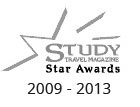Does studying abroad help when finding a job?In a word, yes! According to a study conducted by Global HR News:
Additional findings from this study include:
According to a study done by NAFSA: Association of International Educators, 'Global competence is increasingly valued in the workplace' also:
A 2003 RAND study surveyed 135 Human Resource managers from 75
companies. By consensus, the most important employee skill sets were: Cross-cultural competence ranked 5th out of 19 attributes that 'Make a successful career professional' according to the same study. Of surveyed employers, a significant number agreed that candidates with international study experience are likely to possess key skills such as:
In an article from Butler University, 'The Value of Study Abroad,' research was presented from the Council on International Education Exchange (CIEE) to determine how much employers value a job applicant's study abroad experience: In a survey of 352 U.S.-based CEOs, senior managers, on-campus recruiters, and human resource professionals, CIEE found that while a majority of these employers valued international experience, different people valued different types of programs. Human resource professionals favored longer, yearlong programs to develop the skills they wanted; senior managers, however, favored shorter, 14- to 18-week internships. Employers who had studied abroad themselves placed a higher value on all study abroad experiences. According to Marie-Louise Hansson, a Swedish career adviser and author of 'The Global Business Person: What is the Secret for Success,' there are seven global skills. In looking at this list below, you will find that most of these skills are gained, strengthened, and highlighted through any study abroad experience:
Kimberly Larsson, assistant directory of the Office of International Programs at North Central College, in Naperville, Ill, states in her article, 'Packaging Your International Experience': As college students study abroad in larger numbers and increasingly diverse locations, employers are correlating this experience with employability. Study abroad reflects independence, cultural sensitivity and awareness, self-confidence and reliance, as well as language proficiency. Other new skills can include problem solving, dealing with ambiguity, managing a limited budget, handling situations diplomatically, and acting as an ambassador and a leader. Students also gain an international perspective and country-specific skills that can be useful for potential employers when thinking about a certain market, overseas office, or customer base. In the article, 'Considering the Reasons to Study Abroad' from Dummies.com:
Studying abroad typically gives your resume a nice boost and improves your post-graduate employment prospects, particularly if you're considering a career in business, international affairs, or government service. Nowadays, employers actively seek college graduates who have spent time studying abroad because they want employees with an international knowledge base as well as foreign language skills.
Return to Main Recession-Proofing Page
Sources: 
|
|
||||||||||||||||||||
|
|||||||||||||||||||||









